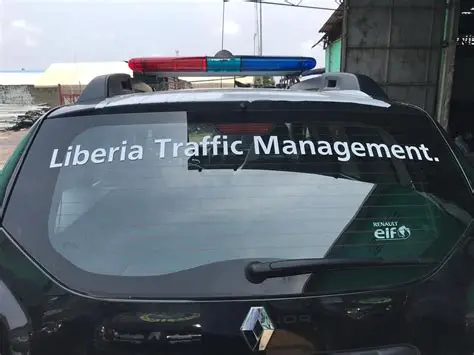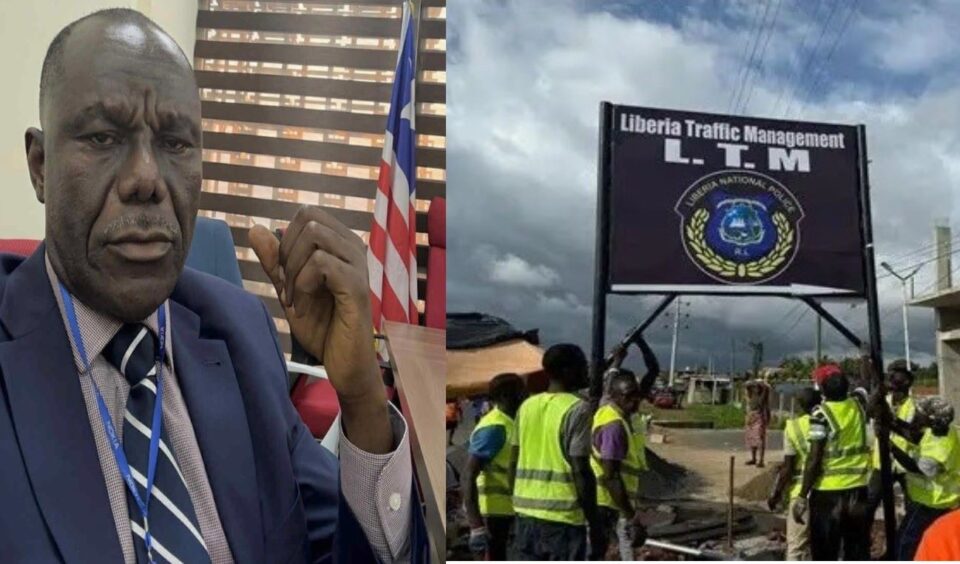Former Deputy Transport Min. Kolliegbo Says It’s Risk To Public Institutions, Urging Lawmakers To Intervene
PHOTO: Former Deputy Transport Min. J. Ebenezer Kolliegbo kicking against LTM deal
By Our Special Correspondent
More opposition continues to be publicly expressed against the contract the Liberia National Police (LNP) has with a foreign company, outsourcing the country’s Traffic Management Services to the Liberia Traffic Management Services, Inc. (LTML), buttressing recent alarm raised by the Chairman of the Senate Committee on Defense, Intelligence and Security, Lofa County Senator Momo Cyrus.

”In my capacity as Chairman of the Senate Committee on Defense, Intelligence, Security and Veteran Affairs, and in keeping with the oversight responsibilities assigned to this committee, I respectfully request the endorsement of Plenary to invite the Minister of Justice and Attorney General along with the Inspector General of the Liberia National Police to appear before the Liberian Senate to address mounting national security concerns surrounding the recent outsourcing of core traffic management services to a private, foreign-controlled entity, namely Liberia Traffic Management, Inc. (LTMI),” Sen. Cyrus said in the Senate plenary in Monrovia.

Sen. Momo Cyrus
“Given the implications of this development, I respectfully request that Plenary authorizes the appearance of the Minister of Justice and the Inspector General of Police before this august body to Present the legal framework under which the outsourcing arrangement was made; Clarify the oversight mechanisms in place to prevent misuse or data leakage,” he noted.
Now, former Deputy Minister for Administration at the Transport Ministry, J. Ebenezer Kolliegbo has sharply criticized the Liberian government’s decision to delegate vehicle registration and driver’s license issuance to the Liberia Traffic Management (LTM), a foreign-controlled company.
The transfer, scheduled to take effect this month, was recently confirmed by a public statement from the Liberia National Police.
Mr. Kolliegbo, who served as Deputy Minister for Administration at the Ministry of Transport, where he led critical reform efforts during the first term of former President EllenJohnson Sirleaf, voiced strong concerns over the handover of these essential functions—“traditionally and legally” under the Ministry’s authority—to a private entity.
The former Deputy Transport Minister, who is a stalwart of the ruling Unity Party (UP), argued that while proponents claim the move is part of modernization efforts, the lack of transparency surrounding the process raises suspicion of a more troubling agenda.
“These tasks have been traditionally and legally the responsibility of the Ministry of Transport. The lack of transparency surrounding the shift suggests something deeper—and more troubling—may be at play,” Mr. Kolliegbo stated.
More Than Just Outsourcing: What’s Left for the Ministry?
In an interview with reporters over the weekend in Monrovia, Mr. Kolliegbo questioned the residual role of the Ministry of Transport now that two of its most visible, revenue-generating functions have been outsourced.
He asked: “Is its work now limited to policy formulation on paper, while implementation lies in the hands of a private or semi-private body? These are not rhetorical questions. They strike at the core of institutional integrity and public accountability in Liberia’s governance.”
Reform or Concession in Disguise?
Mr. Kolliegbo expressed concern that this move might follow a familiar pattern in Liberia—“sweetheart deals” quietly awarded to politically connected individuals or companies, especially in the resource sector.
He called for transparency, questioning, “Was there a public bidding process? Legislative approval? Citizen notification? To date, no official explanation addressing the legal framework has been provided.”
According to him, Liberia’s 1972 Vehicle and Traffic Law assigns driver licensing and vehicle registration to the Motor Vehicle Bureau within the Ministry of Justice.
He pointed out that Liberia’s vehicle administration was shifted in early 2025, when the Justice Ministry used that law to justify outsourcing these duties to LTM.
Historical and Legal Context
Mr. Kolliegbo noted that a 1987 Act of the Legislature established the Ministry of Transport specifically to oversee all national transportation functions.
He emphasized that best practices in countries like the U.S. and Ghana involve civilian agencies managing licenses and registrations, while police focus solely on enforcement.
He also highlighted that Liberia’s 2011 Transport Master Plan proposed establishing an autonomous authority for licensing and registration—yet, now, the police appear to be centrally involved in handing these responsibilities over to a private firm.
He questioned whether this decision reflects internal capacity challenges within government ministries or is simply a means for powerful private interests to gain control.
“In robust democracies, such transfers of public authority typically trigger public hearings, investigative journalism, and legislative scrutiny—none of which have occurred in Liberia,” Mr. Kolliegbo observed.
Risks to Public Institutions
Mr. Kolliegbo, however, warned that outsourcing core transportation functions without legislative or public oversight risks weakening Liberia’s institutions. He pointed to similar concession-style arrangements in sectors like the National Port Authority, public parks, and transportation enforcement.
He urged the government to clarify key issues, including: the ownership of LTM, the legal mandate for the transfer, whether the Ministry of Transport was involved or consulted, if the Legislature approved the move, and what safeguards will be implemented to prevent abuse.
“Until these questions are adequately addressed, the trust of Liberians in their institutions will continue to erode—and rightly so,” something Sen. Cyrus also emphasized to plenary.
Sen. Cyrus told his colleagues in the Legislature with such a deal with the LTML, thee is: “Loss of State Oversight and Command: Delegating enforcement functions, including. Towing and traffic violation enforcement by a private entity blurs the line between state authority and commercial interest, undermining public trust and police legitimacy. Revenue Collection & Accountability: Questions persist regarding the fiscal. Transparency and legal basis of revenue-sharing agreements tied to fines, registration fees, and enforcement surcharges administered by the private firm.”
The Chairman of the Senate Committee on National Security spoke of the need to “address the scope and limits of LTMI’s operational mandate regarding the Liberia National Police Traffic Division and the Ministry of Transport.”
According to Sen. Cyrus, the Legislature has a duty to ensure that all public-private partnerships, especially those intersecting with national security, are transparent, constitutional, and non-threatening to state sovereignty.
“I look forward to Plenary’s approval of this request in the spirit of safeguarding public interest and institutional integrity,” he added.
But so far, Police Inspector General, Gregory Coleman is yet to officially react to the mounting criticisms and security concerns expressed against the deal with the Traffic Management Services, Inc. (LTML).

